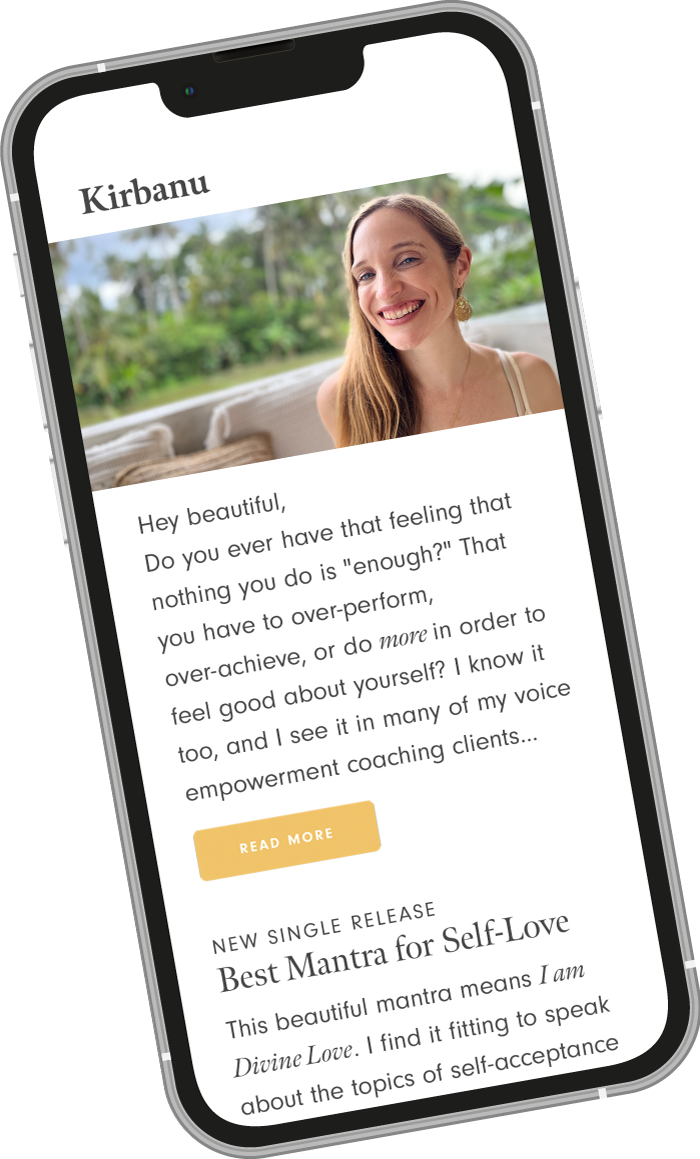The Path to Self-Acceptance
Discovering Inner Peace and Freedom.
Self-acceptance is one of the greatest practices we have on hand to nurture inner peace and to support us in living authentically. In the midst of all life’s challenges, and in a world where we so often find ourselves in a situation of competition or comparison, embracing self-acceptance can be truly transformative.
It’s the step that leads towards true self-love, forming a foundation upon which a healthier and more fulfilling life can be built. Without these two essential components – self-love and self-acceptance – it becomes difficult to operate in a truly joyful, creative, and liberated way. In this post, we’ll explore the concept of self-acceptance, why it’s so crucial, what it looks like in practice, and how to cultivate it daily. By the end, I hope you’ll understand how embracing self-acceptance can change your life.
What Is Self-Acceptance?
These two connected words are all about finding peace with who you are. It means acknowledging and accepting all of the different aspects of you—such as your abilities, shortcomings, achievements, and setbacks—without judgement.
Self-acceptance is not about complacency or resigning to the idea that you can’t grow or change. Instead, it’s about acknowledging where you are now, understanding how you got here, and allowing yourself to be okay with that.
Key Aspects of Self-Acceptance:
Embracing Reality: Self-acceptance is about seeing yourself clearly in the present moment without resistance. It’s acknowledging your current situation, your past experiences, and the way these have shaped you.
Non-Judgment: True self-acceptance involves letting go of self-criticism. It requires observing and treating yourself with compassion rather than judging or labelling yourself as good or bad. As someone who “should” or “shouldn’t” be more than who you already are.
Openness to Growth: While self-acceptance is about embracing where you are now, it doesn’t mean giving up on growth. It means recognizing your potential for change from a place of peace rather than dissatisfaction. It means growing from a place of authentic desire and intrinsic curiosity, rather than out of external pressures.
Why Is Self-Acceptance Important?
It’s essential because it lays the groundwork for emotional well-being and personal growth. Without self-acceptance, we remain in a constant state of inner conflict, feeling as though we should be different from who we are. This internal struggle creates stress, anxiety, and feelings of inadequacy, which prevent us from living fully and genuinely. It binds up our energy, causing us to feel tired, exhausted and losing our lustre for creative exploration and life in general.
The Importance of Self-Acceptance:
Reduces Inner Conflict: When we resist who we are, we create tension within ourselves. By accepting ourselves, exactly as we are at this moment, we’re able to let go of this tension and move towards a state of peace.
Encourages Self-Compassion: Self-acceptance allows us to be kinder and more understanding with ourselves, which fosters self-compassion and emotional resilience.
Enables Genuine Change: True change can only happen when we accept who we are and where we are at, in this exact moment, in our life – with all of what comes with that. Without self-acceptance, attempts at change are often driven by feelings of inadequacy, or the need to become someone that isn’t actually in alignment with our inner truth nor with our actual goals. This is not only unsustainable and ineffective, it simply increases our dissatisfaction with our life.
Supports Healthy Relationships: Self-acceptance helps us approach relationships with a sense of completeness rather than dependence, allowing for more balanced and fulfilling connections.
What Does Self-Acceptance Look Like?
Self-acceptance looks different for every individual, but there are some commonalities. Overall, it’s about embracing imperfection, letting go of comparisons, and creating a healthy intrinsic relationship with yourself.
Signs of Self-Acceptance:
Embracing Imperfections: You recognise your mistakes or errors without allowing that to determine your value. You no longer identify with what you do. Rather you are content with who you are without the need for action to influence that contentment.
Releasing the Need for External Validation: You stop seeking approval from others and recognize that your worth is inherent.
Being Present with Yourself: You allow yourself to be present with your emotions, thoughts, and experiences without running away from discomfort. You lean into them, sit with them, feel them, and you learn more about your own desires and needs from what this information tells you. This allows you to respond from a deeper understanding of yourself and of your true nature.
Self-acceptance is not about pretending that everything is perfect or denying yourself change or growth. It’s about giving yourself permission to embrace yourself and to be who you truly are, while also holding space for growth. It lets you accept who you are and where you are currently at in your life journey, whilst also allowing for the possibilities of change and transformation in the future.
How Self-Acceptance Can Change Your Life!
Embracing self-acceptance can bring about intense changes in your life. Here are a few ways that self-acceptance can positively impact your well-being and personal development:
Increased Peace of Mind: When you accept yourself, you let go of the constant internal battle of trying to be someone you’re not. This creates a sense of inner calm, which allows you to handle all of the challenges that life gives you with greater ease.
Stronger Self-Confidence: Self-acceptance builds self-confidence because it reinforces the belief that you are worthy as you are. When you accept yourself, you stop relying on external validation and begin to trust in your own abilities and act from this state.
Better Decision-Making: With self-acceptance, you make decisions based on what is right for you, rather than trying to meet others’ expectations. This paves the way for a more genuine and satisfying life. It’s all about having your own back!
Healthier Relationships: When you accept yourself, you enter relationships from a place of wholeness. This allows for deeper, more meaningful connections with others, since you’re no longer chasing validation or approval from others. You replace codependency with co-creation, and you become an active player in your life.
Greater Resilience: Self-acceptance gives you the resilience to face life’s challenges. When you accept yourself, you’re better able to handle setbacks and failures, knowing that these do not define your worth. You can pick yourself up with love and compassion, and keep going forward.
6 Tips to Deepen Self-Acceptance Each Day
Self-acceptance is a practice that requires consistent effort. Here are five practical tips to help you deepen your self-acceptance on a daily basis:
1. Transform Negative or Disempowering Self-Talk
Notice how you talk to yourself throughout the day. Is your internal dialogue supportive, compassionate and kind or is it harsh, critical and judgemental? Does the way you speak to yourself make you feel uplifted and content, or does it make you feel small, diminished or even “bad.”
Tip: When you catch negative self-talk, stop and replace it with something kinder. For instance, you could try replacing the comment “I’m not good enough to do this,” with, “I’m making progress, and I’m willing to learn, grow and improve, and that’s what matters.”
An Exercise in Transforming Self-Talk:
This exercise is inspired by The Work of Byron Katie. If you haven’t read her books or watched her talks, I highly suggest you do!
Take a moment to think about a disempowering statement you often make about yourself. Keep it in your mind but try not to become it. Simply be the observer of this thought.
- Place your left hand on your low belly and your right hand over your heart.
- Breathe slow and deeply for 3 breath cycles.
- Gently rub your right thumb across your chest as you did in the last exercise.
- Return to the statement and keeping it in your mind ask yourself the following questions:
- Is this really true? (You need to have solid evidence in the real world for this to actually be proven true).
- How does this belief or thought make me feel (in your body, emotions, mind)?
- Who would I be and how would I feel when I wouldn’t think this any more? Take 2 minutes to visualise this Embody it. Feel it. Let it become real for you.
- Turn it around: Turn the thought on its head. Make your negative statement or belief a positive one and use this new embodied feeling/identity connected to the statement, as well as the statement itself, to guide you over the next period.
2. Accept Your Emotions: Give yourself permission to fully feel your emotions as they come, without any self-criticism. Whether you’re sad, angry, or anxious, allow yourself to experience these feelings. Embracing your emotions is a powerful form of self-acceptance because it allows you to honour your inner experience rather than suppressing or denying it.
For Example: If you’re feeling overwhelmed, acknowledge it by saying, “I’m feeling overwhelmed right now, and that’s okay.” Take a moment to breathe and perhaps even give yourself a cuddle. Self-cuddles can go a very long way in helping us feel safe and nurtured, increasing serotonin, reducing stress and establishing a trusting relationship with ourselves.
3. Celebrate Small Wins: Set aside a moment every day to honour and appreciate your successes, no matter how seemingly insignificant. Recognizing your progress reinforces the belief that you are capable and worthy. Seeing and celebrating small wins helps you shift your focus from what’s left undone to what you’ve accomplished, building a sense of pride and acceptance.
Here’s a simple exercise you can practise at the end of the day, which can support you in this:
- Ask yourself the question: What do I acknowledge myself for today?
- Allow the answer to come to you without forcing it and then say it out loud 5 times: Today I acknowledge myself for…
- As you speak, feel the vibrations of your voice resonating in your chest, beneath your right hand.
- Close your eyes and be present to whatever comes up for you. Hold the sensations in your loving awareness.
- Take 3 slow breaths in through your nose and sign them out through your mouth.
- Return to the moment, allowing this self-recognition to guide you in the next one.
4. Set Healthy Boundaries: Self-acceptance means understanding your needs and setting limits to safeguard your well-being. This could involve saying no to draining commitments or reducing time in harmful environments. Setting boundaries is an essential aspect of self-care and self-respect.
For Example: If you’re feeling overwhelmed by social obligations, practice saying, “I need some time for myself right now, and I’ll catch up with you later.” Another helpful tip is to repeat aloud the word “no” until you feel comfortable expressing it. As my teacher Devi Tide always said, “no” is a complete sentence.
5. Create Daily Self-Care Rituals: Self-care is an act of self-acceptance. When you prioritise your well-being, you send a message to yourself that you are worthy of care and attention. Create daily self-care rituals that nourish your body, mind, and spirit, such as meditation, journaling, exercise, or simply taking time to rest. Example: Start your day with a morning routine that includes activities that make you feel grounded and nurtured, like stretching, sipping tea mindfully, or reading a few pages of an inspiring book.
6. Let Go of Comparison: Comparison can be beneficial. It helps us to decide who we want to be and the way we’d like to live our lives. It helps us to see our role in society in relationship to those around us. And to make any necessary changes along the way.
The problem comes when we use comparison not as a healthy check-in, but a means to punish, limit, or criticise ourselves. Often, this is done unconsciously, we generally base our comparisons on incomplete or distorted views of reality. We may place someone on a pedestal, creating a story about their success, beauty, wealth, or abilities, and use this imagined superiority to justify our own feelings of inadequacy and self-criticism.
“I should be more like her”
“If only I were as smart as him”
“If only I could be more like…”
Comparison done in this unconstructive way just leads to us feeling bad about ourselves.
In contrast, when we stop comparing ourselves to others and let go of their achievements and status, we gift ourselves freedom. This freedom allows us to embrace our uniqueness and live out our own story. We shift our focus from ‘them’ to ‘us,’ concentrating on our own strengths, talents, and accomplishments. By learning to trust ourselves more deeply, we boost our self-esteem, confidence, and self-worth.
As an exercise, try removing the words “should” or “shouldn’t,” “could” or “couldn’t” – or any other word you use to compare yourself to others – from your vocabulary and see what this does to you overtime.
Conclusion: Embracing Radical Self-Acceptance
Self-acceptance isn’t a final goal but an ongoing journey. It involves patience, practice, and a dedication to loving yourself as you are, free from judgement or comparison. By embracing self-acceptance, you can create a life that feels more aligned with your true self, filled with peace, confidence, and resilience.
Remember, you don’t have to be perfect to deserve love and acceptance—especially from yourself. You are enough just as you are. By implementing the tips above, you can begin to deepen your practice of self-acceptance and experience the profound changes it can bring to your life. Whether it’s through mindful awareness, embracing your emotions, celebrating your wins, or setting healthy boundaries, self-acceptance is a powerful tool for living authentically and joyfully.
Transformative Somatic Coaching
Break free from limiting habits, integrate and heal lingering blocks and learn to manifest your dreams with ease!
Why Self-Acceptance matters
The topic of self-love and self-acceptance has been buzzing for the last two year. In fact, even in the last week, I must have read about it more than twenty times! But despite hearing the words “self-acceptance” and “self-love” everywhere, what do these statements even mean. And why are they so important?
One of the things I often see in my clients is the pressure they put themselves under: to “be better,” to “be enough,” to “do enough…” It’s a never ending cycle, that from my own personal healing journey I know too well. So speaking to ourselves like this, is a wonderful way to continually feel bad 😒 And it’s actually the opposite of self-acceptance..
Because, when we make our own happiness and contentment dependent on what we are, how much we do, and what we achieve, we are continually running after these things. We never give ourselves the gift of Being as we are by simply accepting ourselves – the whole spectrum – as we are.
Self-talk Runs Deep!
I know it’s not easy. We’re brought up in a consumerist world where everything has to be more – bigger, better.. and it’s exhausting! But our true nature is not about Doing, rather it’s about Being. And that’s where the way we speak to ourselves has a BIG influence on whether we want to spend time Being with ourselves or not.
Because if you speak to yourself – as I used to – in a harsh, critical, or judgemental way, it doesn’t make you feel good. And who wants to spend time with a person who speaks like that? No-one! So why do we do this to ourselves?
True self-acceptance begins with changing the way we speak to ourselves. It begins with consciously taking control of our inner voice and transforming it from an unfriendly or critical or cold one, to a voice that makes us feel loved, seen and cared for. So my simple question to you is this:
“How do you speak to yourself?”
Please Be Honest.
This isn’t about judgement, it’s about truth. If you reflect within and realise that your self-talk could be kinder, more supportive and more loving than it currently is, then let’s do something about it! This is an exercise from the section on self-acceptance in my upcoming Express YourSELF! course. To do it, you’ll need to stand in front of a mirror at eye level.
- Place your left hand on your low belly and your right hand over your heart. Begin to deepen your breathing and drop deeper into your inner awareness.
- Look into the mirror. Look deep into your own eyes. Know that you’re safe. Know that whatever you feel in this moment is OK.
- When you’re ready, try saying, “I love and accept myself as I am today.”*
- Repeat this five times out loud.
- You may like to gently rub your right thumb across your chest as you do this to give yourself extra comfort and support.
- This is a simple exercise, but it goes very deep, and I recommend time afterwards for you to fully integrate your experience.
***At step 3, if it’s too difficult for you to say “love” try saying “like” or “appreciate” instead.
Podcast Episode #47 – Self Aceptance
Do you question yourself?
In this inspiring episode about Self Acceptance, Kirbanu talks about something she sees within herself, in her clients, in her friends, colleagues, and even in her family. This topic is pressure. The expectation that we find ourselves under in our life. This pressure that we put ourselves under in this society of social media. Wanting to be better, to do more, to want to be liked, all of these things stemming from our culture, the ones who raised us, the people around us.
Kirbanu goes into depth talking about how social media trains us to compare ourselves to everyone else. It removes us from our humanity, from who we are, and it confuses us because we think we need to be a certain way to fit in.
But we don’t, you need to be you. How can we become aware of these beliefs within ourselves, and decide which ones we want to keep? Only from the place of knowing who we are, and self acceptance, can we speak our truth, and express ourselves freely. All of these topics that Kirbanu talks about in this episode are things that she speaks about in her upcoming course. If you’re interested in self acceptance, and how to cultivate it within yourself, tune in and listen to this episode!




